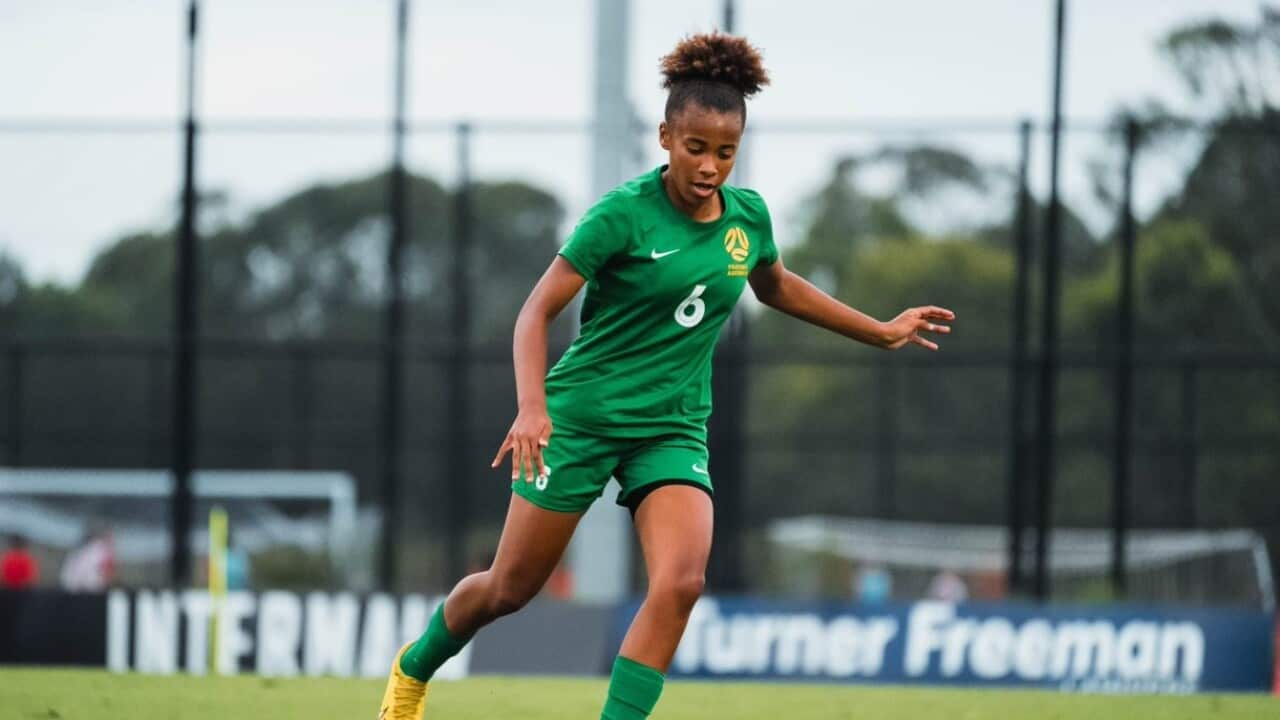TRANSCRIPT
Representing Australia on the world stage with football has long been a dream held by Ischia Brooking.
The 14-year-old experienced a taste of that as a Junior Matilda in her first international game earlier this year in April as part of the 2024 AFC U-17 Women's Asian Cup qualifiers.
The team defeated Mongolia 11-nil with Brooking scoring one of the goals that sealed the deal.
It was a moment she says she'll never forget.
"It was just a state of shock cause I just... I couldn't believe it at all, cause when I hit it I was like 'it's probably going to go not even in the goal'. I was just an incredible moment. Just watching all the photos and the videos, it's just special."
Brooking had already achieved her dream of going professional from age nine.
That hunger was fuelled by following the rise of Perth-born Matilda stars Sam Kerr and Lisa De Vanna.
"I think it's incredible because they've inspired us a lot. Lisa De Vanna, she's local out here, she is always talking to us; helping us to see what our next step in our career is. Sam Kerr, definitely a big role model for us. Everyone here in the WA idolises her. It's incredible."
Fan appetite for this Women's World Cup has broken the record for the most tickets sold at a tournament, topping the 2019 France figures of 1.5 million to reach more than 1.7 million.
This year's tournament is the ninth time it has been held since the inaugural event in China in 1991 when 12 teams participated.
This year, the format was expanded by eight teams to 32 nations participating.
Author of The Matilda Effect, Dr Fiona Crawford, says the upsets in this Women's World Cup have been thrilling to watch.
The fact that we're seeing players now from what we would term quote-on-quote minor countries holding their own against some of the more senior or more experienced countries, that's a good sign because it's actually saying that women's football is developing and that makes it actually more exciting."
Dr Crawford says the story of the rise of women's football in Australia over the last century has been one of triumphing against the odds
"So, they (Matildas) only achieved pay parity as early as 2019. So we're talking in the last four years. Prior to that, they weren't necessarily getting paid anything for the first few decades. It took them (until) 2007 for them to start things like $10,000 annually, which is still not enough to live on. They were still paying for their own laundry, they were still paying for their internet, we know in 2015, they actually even had to go on strike because although they were being paid $22,000 a year, that was actually comparable to being on Centrelink payments. The success that they're seeing now is absolutely remarkable but it's definitely being hard-won and it's really been quite short-lived."
As part of its Legacy '23 plan, governing body Football Australia has set targets to build upon the opportunity of hosting a Women's World Cup.
Federal and state government funding of $357,446,000 has been set aside for legacy-related projects.
The plan includes a goal to achieve gender parity in football participation by 2027.
Women Onside chairwoman Kerry Harris says action needs to be taken now to ensure the game flourishes after decades of underinvestment.
"The only way to close some gaps is to over-invest in one side, and maintain what you have on the other side. I'd also like to bust the myth that the pie gets bigger. The more people you bring into the pie, it gets bigger. It doesn't get smaller for the ones that are already there. It actually gets bigger for everyone that gets included."
Lifting from the current level of 26 per cent female participation to gender parity means welcoming more than 43 thousand new players to the game over the next five years.
There is also a commitment to ensure 60 per cent of all changing room facilities in Australia are female-friendly.
Dr Crawford says a lot more will need to be done to create welcoming and safe spaces for women in what has been a male-dominated sport.
In terms of legacy, there's a lot of talk about change rooms; and the physical structures are definitely important. (But) for me, it's the attitudinal change. I definitely want to see a real normalisation of girls and women playing and participating in football at all levels from the grassroots."
Beyond change rooms, advocates are urging for greater focus on strategies such as mentoring and normalising female leaders in the sport to retain girls in the game and thereby reduce the dropout rate.
Research shows that female participation in community sports in Australia drops off from the age of 15.
Kris Marano founded non-profit Gaining Ground WA three years ago to accelerate the culture shift to bring more girls and women into mentorship, coaching and board roles.
The Canadian-born football player who arrived in Australia in 2017 says she found that a male-dominant culture in coaching and leadership ranks was resulting in a communication disconnect with the female players.
"We saw that type of traditional coaching communication, the sort of very tough (comments) like 'why are you kicking like that', or 'why are you doing that', or sort of sighing throwing the hands down on the sidelines if they don't like something they're seeing from the players. We started to see that again and there was a group of us that wanted to have more positive communication."
While funding is part of the equation, advocates say ensuring inclusion at all levels of women's football is the key to sustainable growth in the world game.













